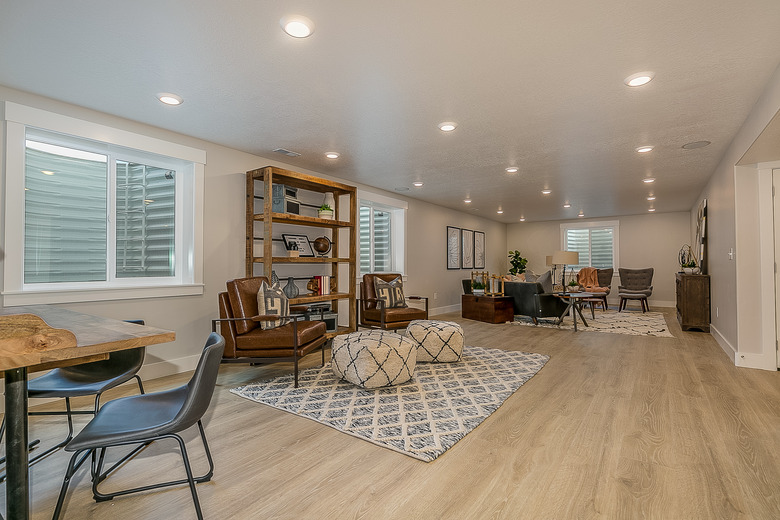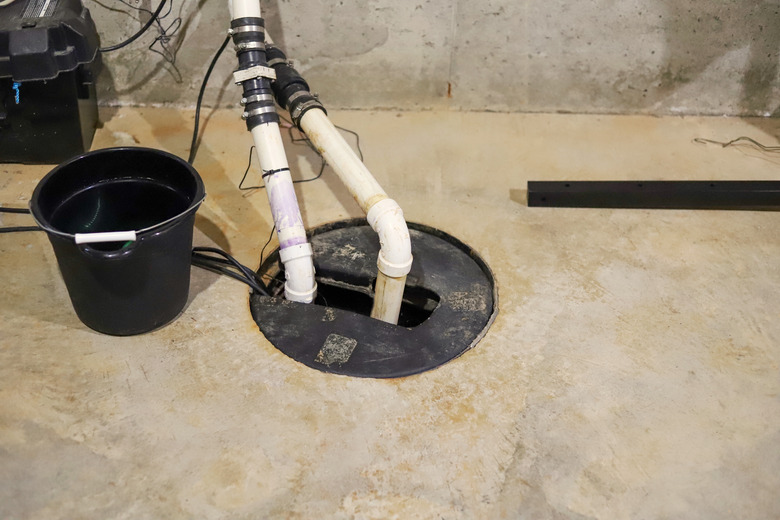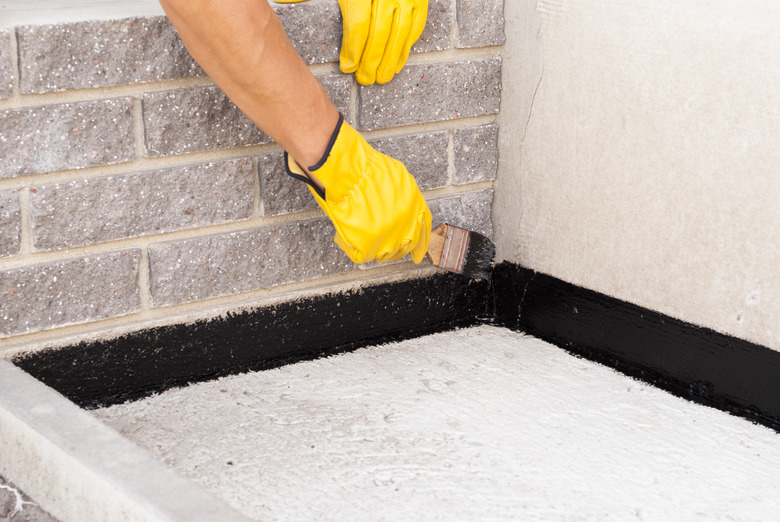How Much Does Basement Waterproofing Cost? (And How To Hire For The Job)
We may receive a commission on purchases made from links.
Anyone with a basement knows the sinking feeling they get when they see the floor full of water after a heavy rain — but that's what can happen when you're due for basement waterproofing. Standing water is one of the worst-case scenarios, but there are others that may not seem as catastrophic but can cause major problems or be signs of bad things to come. Basement water problems can undermine your sense of security in your forever home or portend major repairs if you ever want to sell. For example, stains on the walls or floor, white powdery efflorescence on the walls, and musty odors indicate the presence of mold and mildew that can all but make the basement unusable for sensitive people, even for storage.
Depending on the nature of the water issues, a homeowner can sometimes address them simply by coating the walls with a sealant, but things are rarely that simple. It usually takes the expertise of a basement waterproofing contractor to identify the root cause of moisture problems and recommend the proper waterproofing method.
Ready to hire a basement waterproofing specialist but don't know where to start? Here's how much it'll cost you — and a handy guide to help you hire the best professional for the job.
Tip
Basement waterproofing typically costs between $2,000 and $7,000, although it can cost much more — as much as $15,000 — if the exterior perimeter has to be excavated. The national average cost is about $4,500.
Basement Waterproofing Cost
Basement Waterproofing Cost
The cost of basement waterproofing depends on many factors, but the two main ones are the severity of the water problem and the size of the basement. Many contractors quote by the square foot for interior waterproofing, and that's also a good reference unit for homeowners seeking to handle basement waterproofing as a DIY home improvement project.
There are, of course, other cost factors, including the following:
- Interior coatings: Basements typically have concrete or cinder block walls and a concrete floor, and when efflorescence appears and the basement feels humid but there are no active leaks, homeowners can often improve conditions by applying a sealer, especially to the floor. A contractor typically charges between $3 and $12 per square foot for this service depending on the type of sealer.
- Interior vapor barriers: Lining basement walls and basement crawl spaces with plastic sheeting is an effective way to protect the space from moisture seep. It typically costs from $1,500 to $3,000 to have a contractor do this.
- Baseboard channels: Sometimes, the best solution is to drill holes in the base of the foundation walls and dig a channel that directs water to the drain of a collection area from where a sump pump can pump it outdoors. The typical cost for a contractor to do this is $30 per linear foot, not including sump pump installation.
- Interior drain tile system: The best solution for persistent standing water may be to install an interlocking drain tile system to lift the subfloor above the water level. This method includes installation of a vapor barrier and costs from $25 to $55 per square foot.
Exterior waterproofing methods sometimes but not always call for excavation to uncover the foundation walls, and that drives up costs considerably.
- Perimeter drain: When runoff collects around the foundation, a fairly shallow French drain system can direct it away. Also known as weeping tiles because it employs perforated pipe, a perimeter drain system costs about $5,000 on average.
- Foundation sealing: Waterproofing contractors can seal the foundation exterior with a cementitious sealer. This is a fairly inexpensive option, but the coating doesn't always adhere properly, and it can crack if the foundation shifts. It costs from $1,000 to $1,500, not including excavation costs.
- Waterproofing membrane: The most effective waterproofing method is to cover the exterior walls of the foundation with an impermeable rubberized polymer/asphalt membrane (essentially a water-tight material). This method requires deep excavation to expose the foundation walls. This is also the most expensive method and can cost as much as $15,000 for large buildings.
Beyond the nature of the actual repair strategy, the cost of waterproofing depends on the size of the basement. Many basement waterproofing quotes are based on square footage. Homeowners can normally expect to spend between $5 and $10 per square foot of basement space, but this is at best a ballpark estimate because so much depends on the waterproofing method. Keep in mind that few waterproofing contractors work on an hourly basis. Labor costs for those who do could be anywhere from $30 to $100 per hour or more depending on experience, reputation, and certification.
What a Basement Waterproofing Contractor Does
What a Basement Waterproofing Contractor Does
Knowing the overall cost of basement waterproofing can help you budget, but it's also useful to know what a contractor does so you can prepare for the work.
The first thing a basement waterproofing contractor will do is diagnose the cause of the water issues, and there are many possibilities. For example, the building could be sitting on a high water table, and hydrostatic pressure could be forcing groundwater through the concrete foundation. Another possibility is a drainage issue around the exterior perimeter. A third is a foundation crack or some other damage to the foundation.
While waterproofing contractors may be able to identify the cause of basement moisture issues, not all repairs are in their job description. If the foundation is damaged, for example, a homeowner usually calls a foundation repair specialist to fix it. If the problem is poor exterior drainage, a landscaping contractor may be needed, and dealing with mold in a damp basement is a job for a mold remediation company.
The jobs that waterproofing companies handle include:
- Filling foundation cracks with epoxy and applying interior waterproofing sealants, waterproof paint, or silicate concrete sealants.
- Sealing gaps around basement windows and window wells.
- Installing an appropriate drainage system in the basement floor, such as a drain tile system or a sump pump.
- Excavating the exterior perimeter and installing a sealant, a water-repellant membrane, or a drainage system.
Doing Your Homework
Doing Your Homework
Although it's the job of a waterproofing contractor to help you determine the best waterproofing strategy, you can do some of that homework yourself. Depending on whether the basement has active leaks or is simply damp, you may be looking at strategies that don't require the services of a waterproofing specialist, including:
- Controlling drainage. You may be able to avoid calling a waterproofing contractor by hiring a landscaper to grade the soil around the perimeter of the house or install downspout extensions to direct runoff from the gutters farther from the foundation.
- Waterproofing interior walls. Applying waterproofing sealant is a job you can do yourself, and it can do wonders for a damp basement. If the foundation has cracks, you can also seal them yourself but not if they are large or there are lots of them. In that case, you need to have them inspected by a contractor or structural engineer before you can even think about waterproofing.
- Installing interior moisture barriers. The barriers may be plastic sheets or rigid foam insulation with a waterproof barrier, and they can help reduce humidity in the basement. If there are no active leaks, installing them is a job you may also be able to do yourself.
Most other waterproofing options are jobs for pros, including exterior sealing or interior waterproofing solutions that call for drainage channels and sump pumps. Depending on the scope of the work, you may need a building permit, and you'll be better prepared for the contractor if you look into that before you call.
In some cases, your basement may just need to be dampproofed, which is much less intensive and expensive than actual waterproofing. Dampproofing may involve applying a coating to the interior or exterior of the foundation, but it's only intended to keep out soil moisture. In contrast, waterproofing also keeps out liquid water or handles it in some way, such as with an interior drainage system and sump pump.
Why Hire a Waterproofing Contractor?
Why Hire a Waterproofing Contractor?
You don't need to hire a waterproofing contractor if you can hire a landscaping contractor to solve drainage problems or if the job involves something simple that you can do yourself, such as painting the basement walls. You do need a licensed pro for most waterproofing jobs, though, especially when the repair strategy involves the use of specialized products. Manufacturers of many waterproofing systems will not offer a warranty if their products are not installed by professionals using approved methods.
It's important not to underestimate the complexity of basement waterproofing. You might be wasting your efforts DIYing your basement waterproofing if you don't understand the root cause of the water issues. If you plan on doing any basement waterproofing yourself, you should at the very least consult with a waterproofing contractor to make sure you aren't wasting your time.
Choosing the Right Waterproofing Contractor
Choosing the Right Waterproofing Contractor
Perhaps more than any other home improvement project, basement waterproofing calls for multiple consultations. Each contractor may have a different idea about the best strategy to fix your problem, and many heads are better than one when you're considering what could be an expensive repair. When searching for a contractor, you can often get leads from local hardware stores and building supply centers, but the best references come from friends and neighbors.
Before you decide on a contractor, you'll also want to be sure that the person is licensed and insured. Insurance guarantees that any repairs that aren't successful won't end up costing you more money. You'll also want to know which products the contractor uses, and you should spend some time researching these and reading reviews to be sure they are effective. It doesn't matter if a contractor is competent if the materials are substandard and don't work or don't last long. Instead of a money-back guarantee, many waterproofing contractors offer a warranty, which is an agreement to fix any problems arising from substandard workmanship or nonperforming materials.
As you would before hiring any contractor, ask for references and check each one. You'll also want to research reviews on online community forums and on the contractor's own website. Check the local chapter of the Better Business Bureau for negative reviews.
Waterproofing Contractor Licensing and Certification
Waterproofing Contractor Licensing and Certification
Waterproofing contractors don't need special licensing. Most are general contractors, and whether they need licensing is up to state and local authorities. The Basement Health Association (BHA) offers three certification programs: Certified Waterproofing Specialist, Certified Above-Grade Waterproofing Specialist, and Certified Structural Repair Specialist. Choosing a BHA-certified contractor is the best way to guarantee a top-quality job using top-grade materials.


